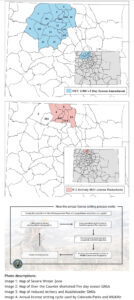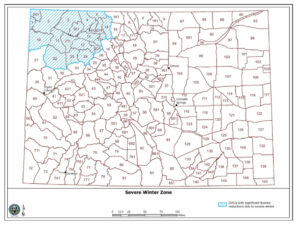DENVER – Colorado Parks and Wildlife (CPW) and the Parks and Wildlife Commission made unprecedented big-game hunting license reductions and shortened some season dates due to severe weather conditions this past winter season.
At the May Parks and Wildlife Commission meeting, CPW staff gave a presentation on the Deer, Elk, Pronghorn and Moose Limited License Recommendations and State of the Herds Update. The 2023 big-game license recommendation summary by species is posted on CPW’s website.
The Commission approved the following regulations for the 2023-2024 big-game season:
- CPW is issuing 236,600 licenses for deer, elk, pronghorn, moose and bear. These license changes include a reduction of 32,000 (-12%) limited licenses from last year.
- Statewide, CPW is issuing 12,600 (-12%) fewer deer licenses than last year. For the northwest region, it’s a reduction of 12,800 (-33%) deer licenses.
- Statewide, CPW is limiting 107,700 licenses for elk, down 15,400 (-12%) licenses from last year.
- Archery licenses for hunt code E-E-004-O1-A and muzzleloader licenses for hunt codes E-E-004-O1-M and E-E-014-O1-M have been reduced by an additional 25%. Only the number of licenses issued has changed. Dates for archery and muzzleloader season in these hunt codes remain the same.


This past winter had the most severe snow conditions residents saw in the past 70 years for the northwest corner of the state, ranging from Rangely to Steamboat Springs and the Wyoming state line — even surpassing the severe winter of 1983-84. Multiple heavy snow storms with strong winds generated hard-packed snow that severely buried food for elk, mule deer and pronghorn.
CPW staff hosted weekly meetings to evaluate snow conditions and observe how it was impacting the survival rates of GPS-collared animals in the area. Based on the findings, CPW recommended that the number of hunting licenses distributed this year in certain game management units (GMUs) be limited to allow herds to recover from a historically harsh winter and sustain abundant wildlife populations in the impacted area.
“This winter has been historic in many ways,” said Meeker Area Terrestrial Biologist Darby Finley. “These recommendations were not easy to make, and we know they will impact more than just CPW, including hunting opportunities and local economies. However, we believe these substantial reductions in licenses will allow herds to recover as quickly as possible.”
Elk licenses:
The Severe Winter Zone is an area known for some of the largest elk herds in the nation, and severe winter conditions have resulted in high elk calf and above-average cow mortality. Survival rates are the lowest CPW has ever documented and below what CPW previously thought possible in elk.
Mule Deer licenses:
While mule deer have fared somewhat better than elk and pronghorn, the combination of severe winter conditions and the high prevalence of chronic wasting disease has affected the resiliency of this population. This, in combination with an already decreased population over the last several years, has prompted CPW to reduce male and either-sex deer licenses in selected areas.
Pronghorn licenses:
Pronghorn in northwest Colorado in the Severe Winter Zone fared the worst during this winter, with mortality starting in December. Poor winter habitat conditions, little to no food sources and increased wildlife-vehicle collisions as pronghorn found relief from deep snow conditions along roadways led to higher-than-normal mortality rates. The affected herds include Great Divide (GMUs 3,4,5,13,14,131,214,301 and 441), Maybell (GMU 11), Sand Wash (GMUs 1,2 and 201) and Axial Basin (GMUs 12, 23 and 211).
“This winter is a great example of why CPW sets license quota recommendations in late spring,” said Northwest Region Senior Terrestrial Biologist Brad Banulis. “By using the data and biological information we collect from late fall through early spring, we can evaluate conditions and make the best license recommendations to meet herd management objectives.”
Other Important Parks and Wildlife Commission Actions:
The Commission shortened the season dates for over-the-counter elk licenses in the Severe Winter Zone for the second and third rifle seasons (hunt codes E-M-000-U2-R and E-M-000-U3-R). The season dates have been shortened to five days (Oct. 28, 2023 – Nov. 1, 2023, and Nov. 11, 2023 – Nov. 15, 2023) if hunting in GMUs 3, 4, 5, 11, 12, 13, 14, 23, 24, 131, 211, 214, 231, 301 and 441. Season dates will remain the same for all other eligible GMUs statewide.
The Commission also finalized regulations modifying the big-game license allocation for black bear, deer, elk and pronghorn from 65% for residents and 35% for nonresidents to 75% for residents and 25% for nonresidents for most hunt codes for those species effective for the 2024 big-game seasons. High-demand hunt codes remain at 80% for residents and 20% for nonresidents.
To find maps and watch the presentation updates, read the Colorado Outdoors Online article Winter In The Northwest: Big-Game Hunting License Impacts.
For more information on hunting in Colorado, visit https://cpw.state.co.us/thingstodo/Pages/hunt.aspx, read updates in the 2023 Colorado Big Game Brochure or watch the “What’s New for the 2023 Colorado Seasons” video.


